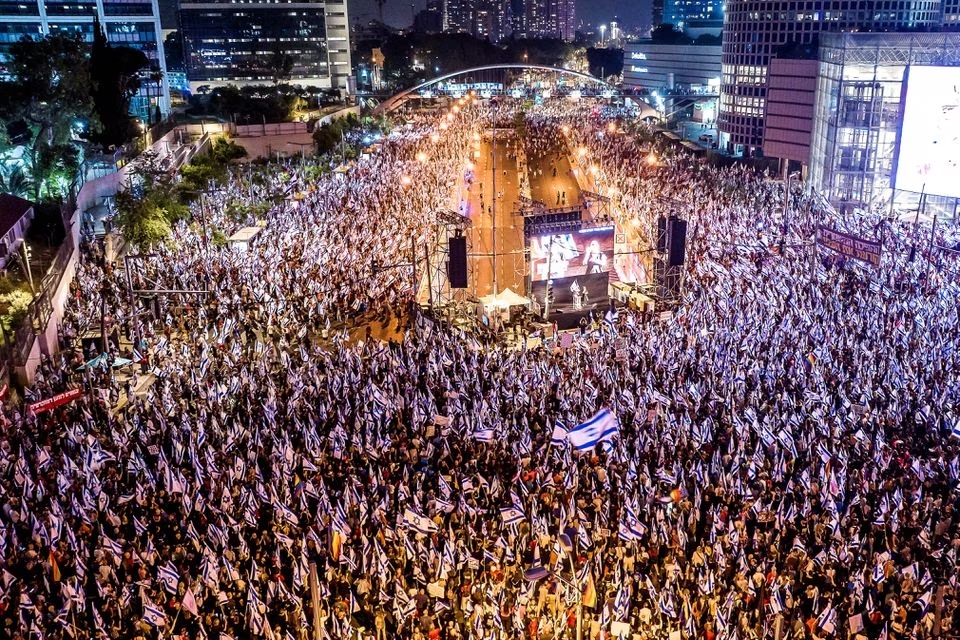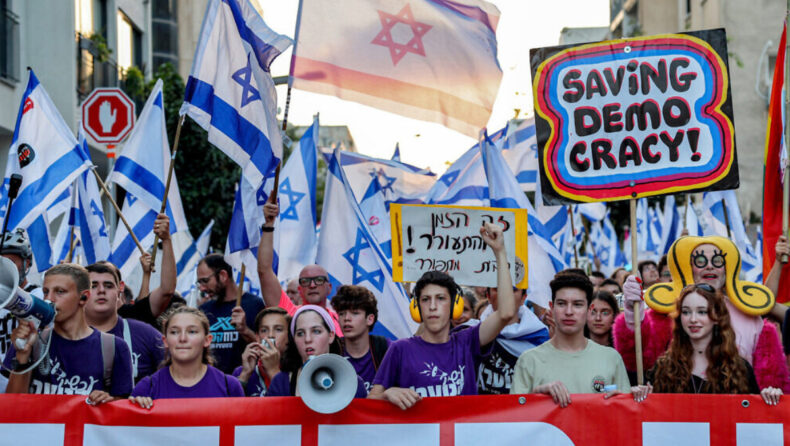Anti-government protests in Israel gained fresh impetus on Saturday night as large crowds rallied against Benjamin Netanyahu’s hard-right coalition government’s contentious plan to overhaul the judicial system. In Tel Aviv alone, about 180,000 people participated in a massive demonstration, while tens of thousands took part in protests held in various other locations across the country. This marks the 27th consecutive week of anti-government protests in Israel.
Israel Parliament’s Bills to Curb Judicial Independence
The wave of countrywide protests began in January in response to two controversial government Bills that aimed to curtail the powers of Israel’s judiciary. The first Bill, an override provision, sought to grant the Israeli Parliament, known as the Knesset, greater control over the nation’s judicial system. Essentially, it would empower the Knesset to pass laws that the Supreme Court had previously declared unconstitutional as long as a simple majority was achieved.

Image Source: Associated Press
The second Bill aimed to increase politicians’ influence in the appointment of Supreme Court judges. Both Bills passed the first three readings on February 20.
Why has the protest gained momentum now?
The nationwide protests, which had paralyzed the country and received international attention, compelled Netanyahu to suspend the judiciary reform in March. He granted an extension to the next parliamentary session to allow negotiations regarding the Bill. Consequently, the protests also subsided to some extent.
However, Netanyahu recently deemed the negotiation talks futile and relaunched the Bills last month, asserting that he had made them more moderate. On July 4, the Parliament voted in favor of the first Bill, which limits the “reasonableness” standard of judicial review. Currently, the Supreme Court has the authority to overturn government and elected officials’ decisions if they are deemed unreasonable. The Parliament is expected to hold the first three votes on the first new Bill next week. This move triggered increasing anger among the protestors, leading to intensified demonstrations on Saturday.
Protestors Block Highways and Gather Outside Key Officials’ Residences

Image Source: Reuters
During the protests, demonstrators blocked the Ayalon Highway in Tel Aviv, as seen in footage shared on social media. Police resorted to using water cannons to disperse the protestors. In the West Bank settlement city of Maaleh Adumim, several dozen protests were held, while incidents of tire fires were reported in Herzliya. Hundreds of protestors gathered outside Defense Minister Yoav Gallant’s residence, planning to stage an all-night demonstration. Meanwhile, thousands rallied outside the President’s residence in Jerusalem.
Protests Serve as Prelude to Critical Parliamentary Vote
These ongoing protests are viewed as a prelude to the massive demonstrations that will escalate in the coming week when the Knesset convenes to vote on the first new Bill. The protestors are determined to safeguard Israel’s democracy by preserving the independence of the judiciary and preventing corruption among politicians.
Political opponents of Netanyahu also oppose the Bills, arguing that they will consolidate power in the hands of Netanyahu and his hard-right allies.













